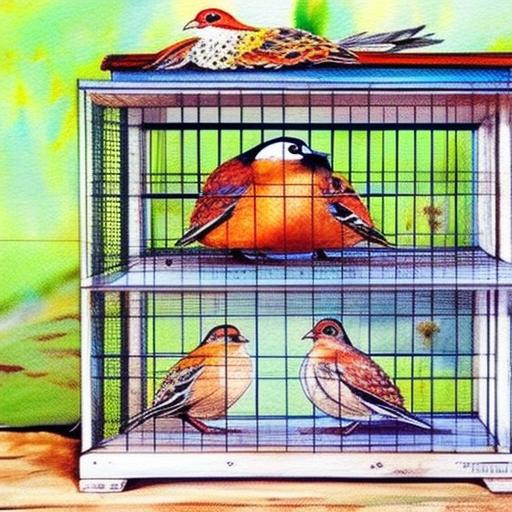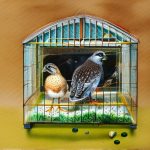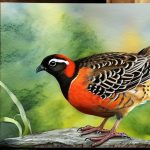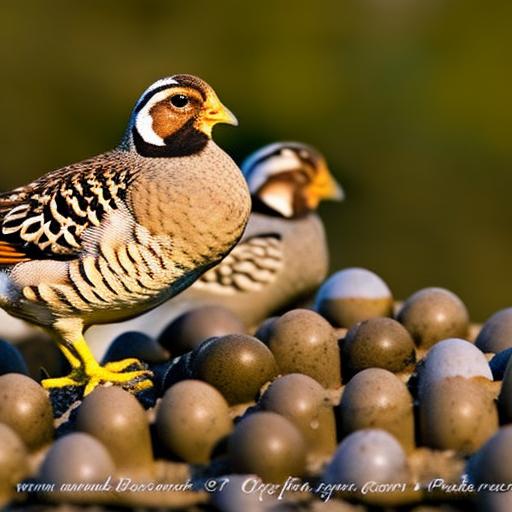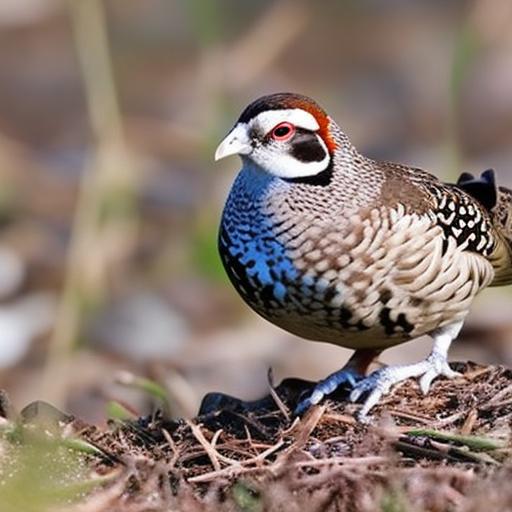Quail breeding is a delicate process that requires careful attention to detail, and one of the most important aspects of successful quail breeding is providing a proper breeding cage for your birds. A proper quail breeding cage is essential for creating a safe and comfortable environment for your quail to thrive and reproduce. It provides the necessary space and conditions for the birds to engage in natural breeding behaviors, such as nesting, mating, and rearing their young. Additionally, a well-designed breeding cage can help to minimize stress and aggression among the birds, which can ultimately lead to higher breeding success rates.
Furthermore, a proper quail breeding cage is crucial for maintaining the health and well-being of your birds. It can help to prevent the spread of diseases and parasites, as well as protect the birds from predators and environmental hazards. By providing a suitable breeding environment, you can ensure that your quail are able to breed and raise their young in a safe and secure setting, which is essential for the long-term success of your breeding program. Overall, investing in a proper quail breeding cage is essential for creating the ideal conditions for successful quail breeding and ensuring the health and well-being of your birds.
Key Takeaways
- A proper quail breeding cage is essential for successful and healthy quail breeding.
- The size and design of the quail breeding cage should be carefully chosen to provide enough space and comfort for the quails.
- Setting up the quail breeding cage with optimal breeding conditions, including proper bedding and nesting areas, is crucial for successful breeding.
- Maintaining cleanliness and hygiene in the quail breeding cage is important to prevent diseases and ensure the health of the quails.
- Providing adequate nutrition and water for quails in the breeding cage is essential for their health and successful breeding.
Choosing the Right Size and Design for Your Quail Breeding Cage
When it comes to choosing a quail breeding cage, size and design are crucial factors to consider. The size of the cage will directly impact the comfort and well-being of your quail, as well as their ability to engage in natural breeding behaviors. A good rule of thumb is to provide at least 1 square foot of space per bird, with additional space for nesting boxes and other breeding accessories. This will ensure that your quail have enough room to move around, mate, and rear their young without feeling cramped or stressed.
In terms of design, it’s important to choose a cage that is well-ventilated, easy to clean, and provides adequate protection from predators and environmental elements. The cage should also be equipped with nesting boxes or areas where the quail can lay their eggs and rear their young. Additionally, consider the material of the cage – wire cages are popular for quail breeding as they allow for good air circulation and are easy to clean. Ultimately, choosing the right size and design for your quail breeding cage is essential for creating a comfortable and safe environment for your birds to breed and raise their young.
Setting Up the Quail Breeding Cage for Optimal Breeding Conditions
Once you have chosen the right size and design for your quail breeding cage, it’s important to set it up in a way that provides optimal breeding conditions for your birds. This includes providing suitable nesting areas, perches, and other accessories that will encourage natural breeding behaviors. Nesting boxes should be placed in a quiet and secluded area of the cage, where the quail can lay their eggs and rear their young without disturbance. Additionally, providing perches or platforms within the cage will give the quail opportunities to roost and engage in natural mating behaviors.
It’s also important to consider the placement of food and water within the cage. These should be easily accessible to the birds, but placed in a way that prevents contamination from droppings or bedding material. Additionally, consider adding natural materials such as straw or hay to the cage, which can provide nesting material for the quail and create a more naturalistic environment. Overall, setting up the quail breeding cage for optimal breeding conditions involves providing the necessary accessories and environmental features that will encourage natural breeding behaviors and ensure the comfort and well-being of your birds.
Maintaining Cleanliness and Hygiene in the Quail Breeding Cage
Maintaining cleanliness and hygiene in the quail breeding cage is essential for preventing the spread of diseases and parasites, as well as ensuring the overall health and well-being of your birds. Regular cleaning of the cage is crucial to remove droppings, uneaten food, and soiled bedding material, which can harbor bacteria and attract pests. It’s important to establish a regular cleaning schedule, which may involve daily spot cleaning and weekly deep cleaning of the entire cage.
In addition to cleaning the cage itself, it’s important to regularly clean and sanitize food and water dishes, nesting boxes, perches, and other accessories within the cage. This will help to prevent the buildup of bacteria and mold, which can pose health risks to your birds. Furthermore, consider using natural or non-toxic cleaning products to avoid exposing your birds to harmful chemicals. Overall, maintaining cleanliness and hygiene in the quail breeding cage is essential for creating a safe and healthy environment for your birds to breed and thrive.
Providing Adequate Nutrition and Water for Quail in the Breeding Cage
Proper nutrition is essential for successful quail breeding, so it’s important to provide your birds with a balanced diet that meets their specific nutritional needs. This may include a commercial game bird feed that is formulated for quail, as well as supplemental treats such as fresh fruits and vegetables. It’s important to monitor your birds’ food intake and adjust their diet as needed based on their breeding status and overall health.
In addition to providing adequate nutrition, it’s crucial to ensure that your quail have access to clean, fresh water at all times. Water is essential for maintaining proper hydration, as well as for egg production and overall reproductive health. Consider using waterers that are designed specifically for quail, which can help to prevent spills and contamination. Additionally, regularly clean and refill water dishes to ensure that your birds always have access to clean water. By providing adequate nutrition and water for your quail in the breeding cage, you can support their overall health and reproductive success.
Monitoring and Managing Quail Breeding Behavior in the Cage

Monitoring and managing quail breeding behavior in the cage is essential for ensuring successful breeding outcomes. This involves observing your birds’ behavior on a regular basis to identify signs of mating, nesting, egg laying, and chick rearing. By understanding your birds’ natural breeding behaviors, you can provide them with the necessary support and resources to facilitate successful breeding.
Additionally, it’s important to manage any aggressive or disruptive behaviors among your birds, which can negatively impact breeding success. This may involve separating aggressive individuals or providing additional space or resources to minimize competition among the birds. Furthermore, consider providing visual barriers within the cage to create separate areas for nesting or mating, which can help to reduce stress and aggression among the birds.
Overall, monitoring and managing quail breeding behavior in the cage involves understanding your birds’ natural instincts and providing them with the necessary support and resources to facilitate successful breeding outcomes.
Troubleshooting Common Issues in Quail Breeding Cages
Despite your best efforts, you may encounter common issues in quail breeding cages that can impact breeding success. One common issue is egg eating, where quail may consume their own eggs due to stress or nutritional deficiencies. To address this issue, consider providing additional nesting material or secluded nesting areas within the cage to reduce stress during egg laying. Additionally, ensure that your birds are receiving a balanced diet that meets their nutritional needs.
Another common issue is low fertility or hatch rates, which may be caused by factors such as age, genetics, or environmental conditions. To address this issue, consider evaluating the age and genetics of your breeding stock, as well as ensuring that environmental conditions within the cage are optimal for breeding. Additionally, consider consulting with a veterinarian or experienced breeder for guidance on improving fertility rates.
Finally, aggression among birds can be a common issue in quail breeding cages, particularly during mating or nesting periods. To address this issue, consider providing additional space or visual barriers within the cage to reduce competition among the birds. Additionally, monitor your birds’ behavior closely and separate aggressive individuals if necessary.
In conclusion, troubleshooting common issues in quail breeding cages involves identifying potential causes of breeding challenges and implementing strategies to address these issues effectively. By understanding your birds’ behavior and needs, you can create an optimal breeding environment that supports successful reproduction and overall bird health.
If you’re considering setting up a quail breeding cage, you may also be interested in learning about the dietary preferences of quails. Understanding what vegetables do quails eat can help you provide a balanced and nutritious diet for your quails. Check out this informative article on PoultryWizard.com to discover the best vegetables to include in your quail’s diet. Learn more about quail’s dietary preferences here.
FAQs
What is a quail breeding cage?
A quail breeding cage is a specially designed enclosure used for housing and breeding quails. It provides a controlled environment for quails to lay eggs and raise their young.
What are the benefits of using a quail breeding cage?
Using a quail breeding cage allows for better management of quail breeding activities, including egg collection, monitoring of quail health, and protection of young quails from predators. It also helps to prevent overcrowding and allows for easier cleaning and maintenance.
What should be considered when choosing a quail breeding cage?
When choosing a quail breeding cage, factors such as size, material, ventilation, and ease of cleaning should be considered. The cage should provide enough space for the quails to move around and engage in natural behaviors, while also being durable and easy to maintain.
How should a quail breeding cage be set up?
A quail breeding cage should be set up with appropriate bedding, nesting boxes, feeders, and waterers. It should also be placed in a quiet and secure location to minimize stress on the quails and provide a suitable environment for breeding and raising young quails.
What are some common mistakes to avoid when using a quail breeding cage?
Common mistakes to avoid when using a quail breeding cage include overcrowding, inadequate ventilation, poor sanitation, and improper placement of feeders and waterers. It is important to regularly monitor the condition of the cage and make adjustments as needed to ensure the health and well-being of the quails.
Meet Walter, the feathered-friend fanatic of Florida! Nestled in the sunshine state, Walter struts through life with his feathered companions, clucking his way to happiness. With a coop that’s fancier than a five-star hotel, he’s the Don Juan of the chicken world. When he’s not teaching his hens to do the cha-cha, you’ll find him in a heated debate with his prized rooster, Sir Clucks-a-Lot. Walter’s poultry passion is no yolk; he’s the sunny-side-up guy you never knew you needed in your flock of friends!

